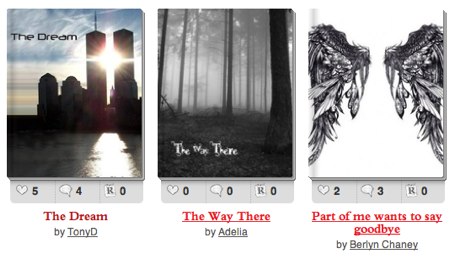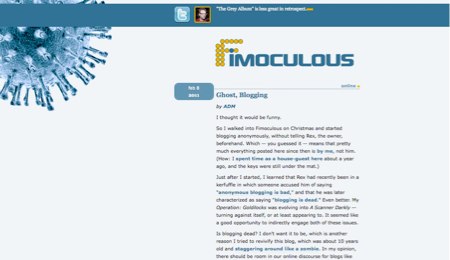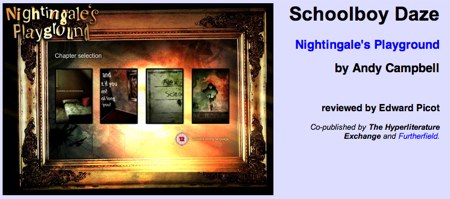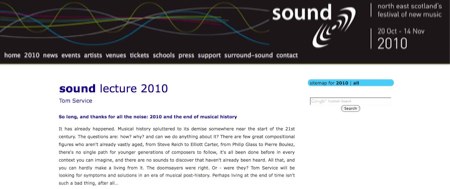April 1, 2011
Stacey Mason
Molleindustria brings us Every Day the Same Dream, an example of game as art. You control a generic man. He wakes up, drives to work, goes to work in a generic cubicle surrounded by men that look just like him. You can interact superficially with a few objects, but for the most part, you’re limited to walking from left to right. You reach an end, and then you wake up again. The art is great and the music (by Jesse Stiles) is exceptional.
Works like this bring up an interesting point about what “games” really are. This work was presented as an example of games-as-art. You control a fictional character in a projected story-world, and you can interact with objects and characters around you (in a very limited way, but in this case that’s the point). Because I was expecting a “game” I was also expecting a degree of flexibility in my actions and of agency in the story . This expectation made my choices feel more superficial, until I realized that the object is to vary the man’s day by connecting with things in the story.
Expectation seems to have an interesting role in agency, as seen in games like this or in Passage. Ebert argues that all games have objectives. With Passage, in my mind there was some kind of objective, even if I wasn’t quite sure what it was beyond gathering items. Ultimately though, there is no “win condition.” I’m affecting the game world to some degree even though the point of the game is to realize that the end is predetermined. The author’s goal here is the metanarrative—the reader’s realization that she can’t change the ending. Is the agency within the game artificial since it all leads to the same ending? Any more artificial than Every Day the Same Dream or any other game with a single “successful” ending and multiple fail conditions? More or less than that of a student reading eLit with no clear ending?
March 28, 2011
Stacey Mason/Mark Bernstein
Figment is a new fiction-sharing website aimed at teens. According to its CEO, Jacob Lewis, membership has reached 28,000 and the site holds more than 55,000 contributed stories.
Who says the internet is ruining our children? Some of the stories are commissioned features, but browsing the shelves at random suggests that some of the writing is not without promise. Here’s a snippet from Kyla Denae’s historical romance, “Sea Winds”:
Ann was finding that the Titanic lived up to her expectations splendidly. In fact, it far exceeded them in many ways. The third class berths were luxurious to a fault, and there were so many things to do and see, not to mention the people one might meet. At luncheon, Ann was seated next to a prodigiously chatty young woman named Enya Dougal and her very quiet husband, Malachy. He spoke not a word during the whole meal, but seemed content enough to let Mrs. Dougal do all the talking for him.
There’s plenty of opportunity to use your red pencil here(splendidly? to a fault? ) but it’s by no means intolerable.
The writers also design images for their book cover, and here their talents and effort truly shine. Some of these covers are superb, whatever lies behind them.
The proposed Google Books settlement proposed in 2008 has been denied by the US District Court. The proposal was intended to settle lawsuits filed by the Author’s Guild and Association of American Publishers against Google, whose book program aimed to eventually digitize all books in the world. Controversy arose from the fact that if authors did not opt-out within the specified time, Google assumed rights to scan the works without the author’s permission.
Judge Denny Chin denied the settlement in its current form due to the controversial opt-out settlement, but will consider a renewal if Google instead provides an opt-in agreement.
Freely licensed manuscript images of the Venetus A Manuscript of Homer have just been released on the iPad, thanks to an initiative of the Homer Multitext Project. The HMT originally scanned the images so that fewer people would have to physically handle the work. Now, thanks to the iPad’s touchscreen interaction, more people may be virtually touching it than ever before.
The Homer Multitext Project is a hypertext endeavor that seeks to combine scanned manuscripts, translations, and other historical scholia to build a historical framework that demonstrates how Homeric texts have changed over time.
HTLit was among the sold-out crowd of 60,000+ gamers at this weekend’s Pax East trade show in Boston. This was the event’s second year, and seemed much more organized and prepared. The venue was bigger, there were more panels, and the game industry seemed to be taking the expo much more seriously. The big companies were there in full force, and some of the lines to try new games had 9-hour wait times.
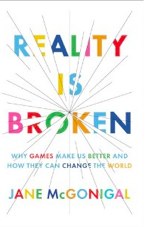
Jane McGonigal’s energetic opening keynote set the tone for a weekend filled with positive attitude. Though we were hoping for more mention of her Alternative Reality Game work, McGonigal did offer fascinating data on the impact of gaming on mood and optimism, dispelling long-standing myths of games as pernicious (ideas that she expands upon in her recent book, Reality is Broken: Why Games Make Us Better And How They Can Change the World). She demonstrated how she made her recovery from a head trauma into a game, and encouraged the audience to turn their daily activities into games. When it comes to gaming, work is often more fun than play.
The panel on dialogue was good. We were disappointed that a number of IF authors, especially Emily Short, were unable to attend, but Blue Lacuna creator Aaron Reed filled in and contributed some interesting thoughts . Dialogue is a particularly difficult skill to master in print, but all the more difficult when the it must have several plausible outcomes. The panel discussed the difficulty, how we might make this dialogue seem more natural and fluid, and the ideal that developers are striving for: an engine which would allow you to make a mistake while speaking to an NPC, have an NPC get the wrong impression, but allow you to correct it somewhat and receive more immediate feedback within a conversation.
A panel on female character representation disseminated a dollop of feminism to an industry known for sexist tropes and stereotypes. Despite a good number of women at the expo, the panel’s audience was predominantly male. The panel argued that women were not turned away by attractive characters or even by nudity, nor are they only looking for strong, perfect female protagonists. Women do dislike poorly developed female characters, and resent the tendency to make all of the females in a game inept or whiney. The panel analyzed several prominent female characters, discussing strengths and weaknesses in their characterizations. The panel also observed that most minorities suffer even worse representations than women.
March 9, 2011
Stacey Mason
Several studies over the years have tried to determine why, despite high achievement in math and science classes, more women do not tend to follow these paths as careers. A new study suggests that female math and science teachers positively affects female students.
I understand this from personal experience,. As a computer engineering student, I was one of a handful of girls in an auditorium of a couple hundred. I never asked questions. I felt that I needed to prove that I belonged there. The stereotype that the male teacher and students believed that I wasn’t as good as they were was reinforced by a particularly embarrassing session with an impatient male teaching assistant, the first and only time I sought after-class help. Asking questions was a sign of weakness that I wasn’t willing to allow in what seemed like hostile territory. I would have felt much more comfortable asking questions to a female professor or TA.
These findings don’t seem like rocket science to me. Of course the 5 female students surrounded by male students and teachers probably feel out of place. The same is probably true of all the minorities in the class. Of course they would feel better if they didn’t feel judged by the people in charge as well as their peers. Has nobody ever thought to ask them?
Resources: Grace Hopper Celebration. BlogHer. Interview with Dame Wendy Hall.
March 8, 2011
Stacey Mason
ADM for Fimoculous discusses anonymous blogging and asks whether blogging is dead. Citing the increased popularity of “TL;DR” (too long; didn’t read), he concludes that blogging is on its way out, in favor of Twitter, Tumblr, and Facebook—that we would rather simply hit the “Like” button than pursue thoughtful discourse across blogs.
This is yet another “our attention spans are getting shorter” jeremiad, and like most of its kind, the article itself is pretty long. When I got to the end, I realized my attention span appears to be intact.
The author does bring up interesting questions on the value of skimming.
A confession before I continue: for every one of those sites I mentioned, I have often found myself getting the gist of a post, thinking "that's a good insight," and then skimming the rest of it. Does that matter?
The post also includes a list of some blogs that are alive and kicking and worth checking out.
March 3, 2011
Stacey Mason
Edward Picot offers a thoughtful analysis of Andy Campbell's Nightingale’s Playground. The review does an excellent job of explaining the format and interaction with the work, and analyzing the piece. The reviewer is clearly familiar with elit and Campbell’s previous work.
This is the kind of thoughtful reviewing of actual elit work should be encouraged, and Picot's Hyperliterature Exchange looks like a promising source of these reviews–particularly considering that their mission is to aid in the sales of these works. All of the reviews the site covers are works that are currently for sale.
We hear the argument all the time that digital works should be free. The ELC offers a collection of free work, and many writers and creators release their work for free or on a donations basis. As a consuming audience, we seem to expect digital materials to be free or cheap, and so we expect our writers to work at a wage that no other industry demands. It's nice to see a site unapologetically promoting authors' work, and telling us a bit about it, so we're not buying on blind faith.
March 2, 2011
Stacey Mason
HTLit will be attending Pax East again this year in Boston, March 11-13. Speakers include IF great Emily Short and game designer Jonathon Myers. , ARG creator Jane McGonigal of I Love Bees promises to be a fascinating keynote.
If you're also attending Pax and interested in meeting up, please email info@HTLit.com.
March 1, 2011
Stacey Mason
In a lecture last fall, Tom Service explained that the end of music history was upon us. Music has been exhausted: there is nothing new to be discovered, nothing is unique, and on top of all of this, you can’t make a living from it. Nobody enjoys listening to “New Music,” and the crowd interested in such works has conditioned itself on the fact that the more unpleasant a piece is, the more sophisticated and “modern.” Music is at the peak of its own destruction.
The scene: the South Bank Centre, new music's concrete-bound HQ in London; the performers: let's say, the London Sinfonietta; the occasion a concert that includes a new piece by a vaunted young composer. Now, one of the extraordinary things – and the first that would strike any newcomer to the scene – is that the audience which has turned up by for a world premiere by much-feted composer X, touted as one of the big hitters of new music, someone who everyone agrees is important for the potential future of the art-form and therefore, at some distant level, for world culture – is so vanishingly tiny. The numbers of empty chairs far outnumber the bums on seats at the Queen Elizabeth Hall, and there's an atmosphere of - well, there isn't really an atmosphere of anticipation at all, as one of our great composer-conductors shuffles onto the podium to conduct the Sinfonietta, in this supposedly epic premiere. The audience's response to this 20 minute work for one-to-a-part ensemble is as tepid as the composer's bows are awkward; her gestures to the players are charmingly unschooled, and her looks to the audience of a combination of bewilderment and pleading please-like-me naivety.
Well, sort of.
The classical music business is in transition just like every other art. Service urges young composers to forget the old models of composing grand pieces on high-profile commissions and performing them before a bored audience who would rather hear the stuff they know anyway.
My sense is that many young composers now realise that the game is up, that the conventional paths to fame and, er, fortune in contemporary classical culture just aren't worth the candle. Instead, they're better off on their own, not least because their music doesn't fit the line-ups of an orchestra, or even the 1 to a part ensembles of the Sinfonietta, or the Birmingham Contemporary Music Group, or Liverpool's Ensemble 10:10, or Manchester's Psappha – a line-up and repertoire whose time has probably also come, has also become a living history more than something genuinely contemporary
.

